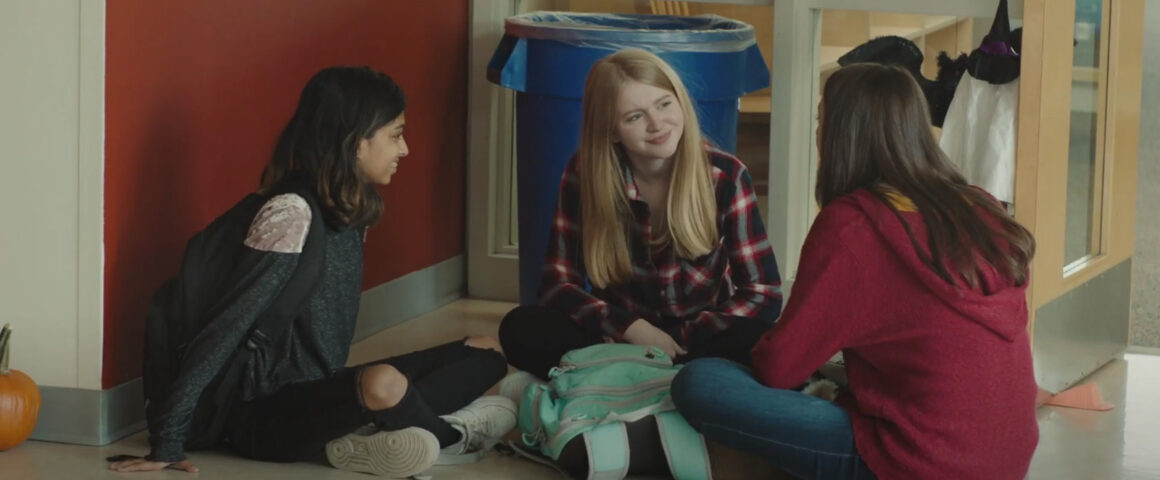There’s no denying that being a teenager is a struggle. From the ever fluctuating emotions to the miscommunications between friends, its an uphill battle. And in the case of media depictions, it can be hard for current adolescents to find something to genuinely relate to. Sure, there’s once-revolutionary representation within 80’s films, along with the more glossy aesthetic of the current Netflix productions. But that might not be every viewers cup of tea. That’s where Sarah and Zachary Ray Sherman’s Young Hearts, starring Anjini Taneja Azhar and Quinn Liebling, comes into frame.
Presented in a documentary-inspired form, Young Hearts tells the story of Harper (Azhar, “Star Trek Into Darkness”) and Tilly (Liebling, “Everything Sucks!” TV series), a teenage girl and boy who fall in love in the most organic of cinematic ways. Growing up as lifelong neighbors, the pair develop a romantic spark between them as Harper enters the chaotic world known as high school. Yet as the two’s affections become public knowledge, Harper and Tilly’s friends, as well as Harper’s brother, Adam (Alex Jarmon), begin to be frustrated with the time the pair constantly spend together — leading the couple to discover the ever disturbing gender politics within their social circles. And as tensions rise, Harper and Tilly must decide if their love can survive the drama.
From the beginning, there’s a delightful bit of awkwardness within Young Hearts — one that dances on the edge of cringe. Yet considering the subject matter at hand, and the age of the person writing this review, let’s just say its easy to feel that way when a teenage you was in a much similar situation. But that relatability is what makes this romantic tale so charming from an aesthetic point of view. Both Sarah and Zachary Ray Sherman do a lovely job of capturing the magical quality of adolescent love in its purest form. At times, their filmmaking style evokes the humble qualities of a young Cameron Crowe, especially within the film’s more intimate moments that seem like the spiritual successor to “Say Anything.”
The same sorts of accolades can be given to the film’s leads, who seem to have bright futures ahead of them. Anjini Taneja Azhar has a delicate — yet memorable — onscreen presence, one that would be fascinating to see blossom as her career goes on. She makes Harper a character young girls can relate to, flaws, oversized sweaters, and all — especially within her more vulnerable moments. Similarly, Quinn Liebling wonderfully personifies the dorky, artistically inclined boy next door. He definitely has a heart of gold, but one that is under the influence of that most face-palm worthy of peer pressure. And when Azhar and Liebling get to bounce their talents off one another, their focus towards evoking every lovingly awkward gesture and motion is hard to dismiss.
But for every bit of genuine feeling within this teen drama, the biggest issue comes from its steadfast dedication towards authenticity. From the at-times laughable soundtrack selections to the cumbersome dialog, many elements within the film seem like that uncomfortable mixture of deliberate yet messy. One example happens when Tilly attempts to confront a classmate that makes horrible rumors up about Harper. Our young protagonist stands face to face with his adversary, seeming like he’s going to punch him. But instead, after the bully makes an off-handed homophobic comment, Tilly just walks away with nothing being accomplished. Do these awkward interactions happen between teens? Of course. Yet the ultimate question I ask is, what is the point? What do moments like this mean for the film’s end goal? It seems like the Sherman’s might not even have that answer themselves.
In fact, Young Hearts presents us with two characters that are trying to evolve into their mature selves, but there seems to be no obstacle getting in the way of their adult journey. Sure, the true “villain” of the movie is the double standard that teen couples face when sex comes into the relationship, but this is far from a groundbreaking topic to address in films of this genre. Additionally, every other sprinkle of characterization (including Harper’s Indianan origins and her interest in gender politics) pretty much goes nowhere in terms of the plot. Sarah Sherman’s script consistently introduces new elements to the ensemble’s lives, but there seems to be no genuine payoff.
Overall, while other recent teen flicks pull off this magic trick of believability (especially Alice Wu’s “The Half of It”), Young Hearts does little to elevate its core themes, its characters, along with its young cast. Sure, the Shermans do have many charming filmmaking qualities, but it takes more than that to make a game changing entry in such a well established genre. And while the film’s leads anchor the story into a heartfelt direction, characters such as Harper and Tilly deserve an ending to their story that is just as fascinating as its beginning.



